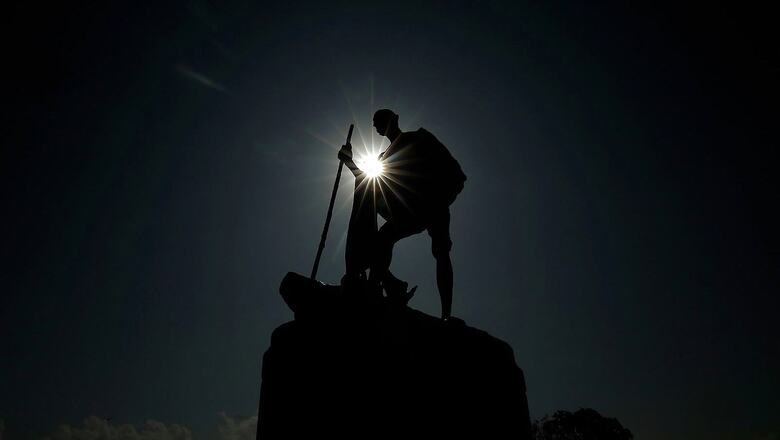
views
It was on July 6, 1944, that Netaji Subhas Chandra Bose addressed Mahatma Gandhi as “Father of our nation” in his radio broadcast. This epithet has stuck to Gandhi’s name with no less intensity than that of the ‘Mahatma.’
This appellation has led some historians and politicians to argue that despite his strong differences with Gandhi, Bose accepted the supremacy of Gandhian political philosophy, programme and leadership. By extension, it is argued that had he returned to Indian politics after the war, Bose would have had no problem in accepting the projection of Gandhi being at the heart of India’s global image and narrative. The question that should have been asked by these politicians and historians, but hasn’t been, is that why the epithet had to come from a political adversary and not from any of the Gandhi-worshipping stalwarts.
To be able to understand this seemingly contradictory occurrence, it is essential to look at the relation between the two leaders in its entirety.
The first impression of a twenty-four-year-old Bose when he met Gandhi in Bombay in 1921 on his way back to Calcutta from England after resigning from the ICS was not a satisfactory one. He wasn’t convinced about the effectiveness of Gandhi’s plans for Swaraj. He felt that “there was a deplorable lack of clarity in the plan which the Mahatma had formulated and that he himself did not have a clear idea of the successive stages of the campaign which would bring India to her cherished goal of freedom”.
The fact is that no two individuals could have been more different than Bose and Gandhi in every aspect of life, encompassing both their mental world and physical makeup. They differed in their worldview, philosophy of life, interpretation of India’s heritage, attitude towards religion and ideas regarding the development of free India. Naturally, they had completely different views on the nature of struggle that needed to be waged to make India free.
It was in the Calcutta Congress session of 1928, a year and a half after he was released from a gruelling incarceration in the Burmese prisons, that Bose challenged Gandhi publicly for the first time. Still a political greenhorn, Bose opposed the undisputed leader’s resolution seeking dominion status for India and argued in favour of having complete independence as the goal of the Congress. Gandhi just about secured the victory for Dominion Status, with 1350 delegates voting against Bose’s amendment, and 973 voted in his favour. Gandhi wasn’t pleased. He was equally unhappy, if not more, with the drill by the Congress volunteers in military style under the leadership of Bose, himself dressed in a military uniform. “The volunteers dressed in European fashion presented, in my opinion, a sorry spectacle in Calcutta,” Gandhi wrote in Young India.
Around the same time, speaking at an All-India Youth Congress meeting, Bose severely criticised the ‘effects and consequences’ of the Sabarmati school of thought for creating “a feeling and an impression that modernism is bad, large scale production is an evil, wants should not be increased and the standard of living should not be raised, that we must endeavour to the best of our ability to go back to the days of the bullock-cart and that the soul is so important that physical culture and military training can well be ignored”. This was just the beginning.
In October next year, the Viceroy Lord Irwin announced that the British government was going to hold a conference of representatives from British India as well as the Indian states to discuss India’s constitutional progress. Attainment of Dominion Status was the “natural issue of Indian constitutional progress”, he said. When the leaders of the major political parties led by Gandhi issued a manifesto in response to the Viceroy’s statement, appreciating the sincerity of the Viceroy’s declaration and offering cooperation to the process of developing a scheme of dominion constitution, Bose, along with Saifuddin Kitchlew of Lahore and Abdul Bari of Patna, issued a counterstatement that the Viceroy’s announcement “as it stands contains nothing over which we could enthuse”.
Rather than be misled by the ‘pious statements’ of the British government, the need of the hour was to prepare for the ensuing struggle, they argued. Bose was proven right when in a meeting on 23 December with Gandhi, Motilal Nehru, Vithalbhai Patel, Tej Bahadur Sapru and Jinnah, the Viceroy refused to commit the proposed conference to framing a Dominion constitution.
The next annual session of the Congress to be held in Lahore was just around the corner, and the year’s dominant choice for presidency with maximum votes from the provinces was Gandhi, although Bose received more votes than him from Bengal. Refusing to accept the post Gandhi, however, appointed Jawaharlal in his stead.
The main resolution moved by Gandhi set the overall framework for 1930: the failure of the talks with the Viceroy meant that participation in the proposed round-table conference would be pointless, the word ‘Swaraj’ now meant complete independence, and in pursuance of that creed all Congress members in central and provincial legislatures and Government committees should resign their seats.
As the British government hadn’t accepted the Constitution proposed by Congress, Gandhi moved the main resolution declaring that the goal now was complete independence and authorising the All India Congress Committee (AICC) to launch a new civil disobedience movement. Bose felt that the goal was set, but without a clear plan of how to reach there, and therefore he moved a counter-resolution asking the Congress to work towards setting up a parallel Government in addition to launching the civil disobedience movement. Gandhi categorically asked the Congress to reject Bose’s counter-resolution, taking a dig at his claim of representation of the youth. Gandhi made clear that as far as leadership of the youth was concerned, his preference was Jawaharlal.
Bose’s recommendation of working towards setting up a parallel government drew his special ire. Laced with not-so-subtle sarcasm, he asked, “Do you think you can establish a parallel government when the Congress flag does not fly even in a thousand villages?’ How Gandhi’s plans evolved over the next decade and a half in the context of the issue of unpreparedness makes for a fascinating study. Was the country more prepared in 1942 or in 1947? The final victory was Gandhi’s. The Congress voted overwhelmingly in favour of his programme for the next year at the stroke of midnight. Bose was dropped from the Congress Working Committee.
The Gandhi-Bose relationship had started on a path of ideological conflict, which kept aggravating. Gandhi was well aware that Bose would not subscribe to his worldview, and by now it should have been clear to him that Bose’s opposition was not cast in the mould of rebellion followed by submission, as was the case with Jawaharlal Nehru. In August 1929, he wrote to Satish Dasgupta in Bengal, “Subhas babu will never pardon the loin cloth. We must bear with him. He cannot help himself. He believes in himself and his mission. He must work it out as we must ours.” This distant but accommodative stance took a hit in the last few months of 1929.
On January 3, 1930, immediately after the conclusion of the Lahore Congress, Gandhi issued a stern admonition to Bose which made clear that he was mighty unhappy with the latter’s action. The statement made a laboured attempt at justifying his own actions by putting the blame on Bose:
“You are becoming more and more an enigma to me. I want you to live up to the certificate that Deshbandhu once gave me for you. He pictured you to me as a young man of brilliant parts, singleness of purpose, great determination and above pettiness. Your conduct in Calcutta therefore grieved me, but I reconciled myself to its strangeness. But in Lahore you became inscrutable and I smelt petty jealousy. I do not mind stubborn opposition. I personally thrive on it and learn more from opponents than from friends. I therefore always welcome sincere and intelligent opposition. But in Lahore you became an obstructionist. In connection with the Bengal dispute, in your writings to the Press you were offensive and the discourteous, impatient walk-out nearly broke my heart. You should have bravely recognised the necessity and the propriety of your and other friends’ exclusion [from the working committee]. It was not aimed at you, Prakasam or Srinivasa Iyengar. It was meant merely to strengthen the hands of the young President by providing him with a cabinet that would be helpful in carrying forward the national work. I simply write this to ask you to retrace your steps and otherwise also prove to me and those whose cooperation you would seek, the truth of the certificate issued by Deshbandhu. I do not want to change your view about anything, but I do want you to change your conduct in enforcing those views.”
Bose explained his own point of view a week later in a discussion with the British Left wing journalist and member of the Independent Labour Party, HN Brailsford. Brailsford asked Bose if he would still oppose the Roundtable Conference if Dominion Status was granted to India immediately. Answering in the affirmative, Bose explained the three reasons behind his stand. First, he said that Britain would retain the economic supremacy over India which would continue to drain the country’s resources and keep it poor. Second, he could not see any political benefits of India becoming a dominion.
Third, Indians would continue to suffer psychologically from a sense of inferiority, and that would prevent their all-round development. Bose explained that to be able to understand this point, one had to remember the very long period for which India had remained under the domination of foreign powers. The present education system established by the foreign rulers also reinforced the sense of inferiority. Complete freedom was the only way to unshackle the minds of Indians.
Even before the civil disobedience movement started with the observation of 26 January as Independence Day in 1930, Bose was arrested on his birthday. He was released nine months later on the night of 23 September.
Talks between Gandhi and Irwin began on 17 February 1931, leading to the Gandhi-Irwin Pact, according to which the civil disobedience movement was discontinued on the condition of reciprocal action to be taken by the Government in line with the Congress’ demands. It was agreed that the Congress would participate in the next round of discussion on constitutional progress. Bose viewed the pact with some degree of hostility. He could see that to the general populace it appeared as a victory of the Congress, but the youth organisations and especially the political prisoners of Bengal were unhappy. Yet, he also realised that there was nothing he or anybody else could do to bring about any change to the way events were shaping up.
The Left wing, according to Bose, had two options: either to put up an insignificant opposition at the next annual Congress session in Karachi or refrain from dividing the Congress while still disapproving of the pact. Moreover, merely opposing the pact was not enough; the alternative was to commence the movement again. In the conditions that existed after a massive and prolonged crackdown by the government on Congress workers, Bose had “no doubt that the response in men and money would be disappointing”.
In short, if the opposition to the pact failed, it would be an exercise in futility, and if it succeeded in toppling the agreement but failed to build up a more vigorous national movement, then too it would be futile. Thus, Bose did not just agitate on the point of Congress participation in the Roundtable Conference, he also voiced his opposition to it. For him, the talks were an exercise designed to fail and to weaken the position of the Congress, and by agreeing to send Gandhi to the Conference, the Congress was walking into a trap.
On Gandhi’s return to India on 28 December 1931 after the failed talks at the Roundtable Conference, the Congress working committee met from 29 December 1931 to 1 January 1932 to deliberate on the next course of action. Decrying the repressive Ordinances issued by the government and the arrests made, the Congress threatened to resume the civil disobedience. The government reacted swiftly. On 3 January 1932, Bose was arrested under Regulation III of 1818 at Kalyan, on his way back to Calcutta from Bombay. Gandhi and the other top Congress leaders too were thrown into jail.
Bose stood vindicated in his stand of not trusting the British government to make any progress towards India’s freedom. After prolonged illness in prison, Bose was packed off to Europe where he arrived on 6 March 1932.
This is Part 1 of the two-part series.
Read all the Latest News and Breaking News here



















Comments
0 comment